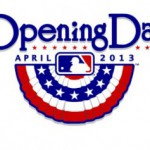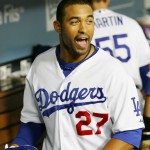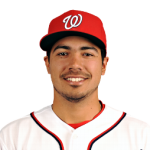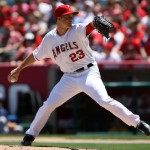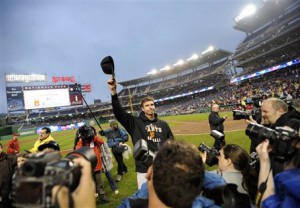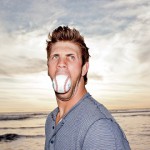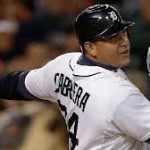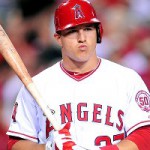Opening day has past and I forgot to post the obligatory “predictions” piece for 2013. Here’s some far-too-early predictions on who makes the playoffs this year. For comparison purposes. here’s the Si.com Writer’s slate of predictions, with lots of success predicted for our Nats. My predictions below look awfully similar to Si.com’s Baseball Preview standings too.
(For a trip down memory lane, here’s a link to my 2012 seasonal predictions, and as you may have guessed, I was way off).
- AL East: Tampa Bay
- AL Central: Detroit
- AL West: Los Angeles Angels
- AL Wild Cards: Toronto, Oakland
AL East Narrative: The year the Yankees died; they’re too old, too dependent on aging arms and aging bats, and did next to nothing to improve in the off-season (though they did just pick up Vernon Wells, the Angels’ 4th outfielder. Great!) For a team that makes hundreds of millions of dollars of profits a year from the stadium and their TV station, they seem awfully worried about a few million dollars of luxury tax. (see *ahem* Los Angeles Dodgers *cough*). I think Baltimore regresses back to the .500 team they should have been in 2012 (they too failed to appreciably improve their playoff team), and Boston seems stuck in some weird middle-ground for the time being. Toronto seems greatly improved but falls slightly short of the champ. Tampa is left standing in the AL East; they won’t miss James Shields that much with their amazing pitching depth and can call up the next version of Trout/Harper in Wil Myers in mid June.
In the AL Central, Kansas City’s short sighted trade will net them a .500 record, but isn’t nearly enough to catch the Tigers, who return their whole rotation, get back Victor Martinez and add a possibly underrated Torii Hunter to add to their formidable lineup. How they only won 88 games last year still amazes me. The White Sox could challenge, but what have they really done this off-season either? On the bright side, all these teams get to feast on Cleveland and Minnesota, both of whom look to lose 90+ games.
In the AL West, the Angels (who had the best record in baseball post Trout-callup) continue where they left off and bash their way to a 90 win divisional title despite serious questions in the rotation. Texas hasn’t replaced what they lost in the last two off-seasons in terms of either hitting (Josh Hamilton) or pitching (C.J. Wilson, Ryan Dempster, or Colby Lewis) but should still compete for the 2nd wild card. But, absent signing Kyle Lohse (too late; he went to Milwaukee) or doing something to augment their starting pitching, I see trouble in the back of their rotation. Meanwhile, Seattle made one curious move after another this off-season, all to finish in 4th place. And Houston will challenge the 1962 Mets for futility, to the benefit of the entire division.
Wild Cards: Toronto has bought themselves a playoff team with their wholesale purchase of half the Marlins team. However, I wouldn’t be surprised to see both WCs come out of the AL west, who get to feast on two pretty bad teams. For the time being i’ll predict that Oakland and Texas duke it out to the wire, with Oakland pipping them for yet another surprise playoff appearance. Oakland won the division last year; who would doubt them again this year with a very young pitching staff having one additional year of experience? I think it comes at the expense of Texas this year instead of the Angels.
How about the NL?
- NL East: Washington
- NL Central: Cincinnati
- NL West: San Francisco
- NL Wild Cards: Atlanta, St. Louis
NL East Narrative: Despite some people thinking that Atlanta has done enough to get by the Nats, I don’t quite see it. The Upton brothers are high on potential but so far relatively low in actual production except in fits and spurts. Philadelphia can make a decent run up to perhaps 88 wins … but it won’t be enough, and reports of Roy Halladay‘s declining velocity are more than troubling. Meanwhile the Marlins are going to be historically bad; in the past when they’ve done sell-offs they had marquee crops of rookies to rise up. Not this time; their farm system is decimated and they didn’t really get back the A-1 prospects of all their salary dumps that they should have. The only way the Nats don’t cruise to a title would be significant injuries in the rotation, for which they have little insurance.
In the NL Central, St. Louis’ loss of Chris Carpenter may be just enough to knock them out of the divisional race, where Cincinnati looks like the most complete team outside of the Nats in all of baseball. Pittsburgh is a couple years (and a couple of pitching aces in Jamison Taillon and Gerrit Cole) away from really competing, the Cubs are content losing 95 games, and Milwaukee still looks like the same team that barely was .500 last year (even given the Kyle Lohse signing).
In the NL West; who would bet against the Giants at this point? Despite the ridiculous payroll, I don’t think the Dodgers are really that good and they’re hoarding starting pitchers for too few spots (though, looking at the Spring Training performance of some of these guys … they’ll likely not fetch what the Dodgers need). Arizona keeps trading away its best players to get marginal prospects who happen to fit Kirk Gibson‘s mold of a “gritty player” … and they seem to be set to be a 3rd place team again. Colorado and San Diego seem to be in various states of disarray, again.
Wild Cards: Atlanta may be a 96 win wild card. Meanwhile, despite losing Carpenter the Cardinals can slot in any one of a number of high-powered arms to replace him in the rotation and continue to draw from what is now the consensus best farm system in the majors. They’ll sneak into the wild card much as they did last year and commence bashing their way through the playoffs.
AL Playoff predictions:
- WC play-in: Toronto beats out Oakland, whose youngsters will be completely baffled in a one-game playoff versus R.A. Dickey.
- Divisionals: Toronto beats intra-divisional rival Tampa Bay, while Detroit takes advantage of a weakened Los Angeles rotation and takes a close series.
- ALCS: Detroit outlasts Toronto in the ALCS on the strenght of its starting pitching.
NL Playoff predictions
- WC play-in: Atlanta beats St. Louis in the play-in by NOT allowing an infield-fly pop up to fall in this year.
- Divisionals: Washington outlasts Atlanta in one brutal divisional series, Cincinnati gets revenge on San Francisco in the other.
- NLCS: Washington over Cincinnati; they’re just slightly better on both sides of the ball.
World Series: Washington’s proclivities to strike out come back to haunt them as the Tigers excellent starting pitchers dominate. Can’t be too confident in our Nats; i’d love to be wrong and send out Davey Johnson a winner.
Awards: this is just folly to do pre-season awards picks but here’s a quick run through without much commentary:
- AL MVP: Mike Trout gets the award he should have won last year
- AL Cy Young: Justin Verlander as he wins 24 games in the weak AL Central
- AL Rookie; Wil Myers, who rakes once he gets called up in June
- AL Manager: Joe Madden, who guides Tampa to the best record in the AL.
- NL MVP: Joey Votto, though I wouldn’t be surprised to see Bryce Harper in the mix either as the default “best player on a playoff team” voting scheme takes over.
- NL Cy Young: Stephen Strasburg, who won’t have as good of numbers as Clayton Kershaw but gets the nod because of east coast bias.
- NL Rookie: Jedd Gyorko, though Julio Teheran could finally have it figured out.
- NL Manager; I have no idea; this usually just goes to the most “surprising” team and I don’t see many surprises in the NL this year. Bruce Bochy.
